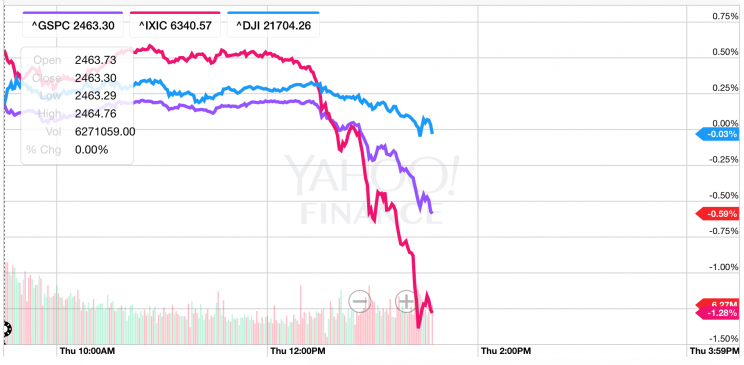JP Morgan's top market guru just identified a chilling pattern in the stock market

Stocks have been getting slammed on Thursday afternoon.
Near 1:30 p.m. ET, the tech-heavy Nasdaq (^IXIC) was down as much as 1.2%, while the S&P 500 (^GSPC) and Dow (^DJI) — after having traded higher earlier in the session — were moving to their lows of the day.
Volatility as measured by the CBOE’s VIX index (^VIX) was also spiking.
The decline in the market appears to have coincided with the publishing and circulation of a research note from JP Morgan strategist Marko Kolanovic, who among other things noted that the recent decline in stock correlations we’ve seen mirrors action investors saw before big sell-offs in 194 and 2001.
“Over the past year, correlation of stocks and sectors declined at an unprecedented speed and magnitude,” Kolanovic wrote in a note to clients.
“A similar decorrelation occurred on only 2 other occasions over the last 30 years: in 1993 and 2000. Both of those episodes led to subsequent market weakness and an increase in volatility (in 1994, and 2001). The current decline in market correlations started following the US elections and was largely driven by macro (rather than stock specific) forces.”

A de-correlation in stocks basically means that individual stocks began moving in different directions at different times, rather than in the same direction at the same time. Typically, correlations spike when worries are high in the market; when panic takes over, investors have a tendency to dump everything almost indiscriminately. During periods of calm and confidence, correlations will recede as investors become more discerning of their investment choices.
Kolanovic notes that in 1994, a rise in interest rates and a re-correlation in the stock market saw a 10% correction. In 2000, with markets bouncing off lows made during the brief 1998 crisis triggered by Russia’s default and Long-Term Capital Management’s bankruptcy, correlations plummeted.
“It ended with the tech bubble in March 2001,” Kolanovic writes, “which marked the low pint of equity correlation and start of recession. Subsequently, the market declined ~30%, bottoming in late 2002.”

This note comes during a day when markets had rallied after strong earnings results from market bellwether Facebook (FB) and telecom giant (and Yahoo Finance parent company) Verizon (VZ).
Amazon (AMZN), another market leader and member of the vaunted FAANG stocks — which also includes Apple (AAPL), Netflix (NFLX), and Google parent-company Alphabet (GOOGL) — is set to report earnings after the market close on Thursday. Earlier in the day, a rally in Amazon shares to a new record high made its founder and CEO Jeff Bezos the world’s richest man.
Additionally, investing legend Howard Marks published a widely-read memo on Wednesday that warned on a variety of market conditions right now, including positioning around the FAANG stocks and a lack of ideas about what could go wrong in markets.
“Since we never know when risky behavior will bring on a market correction, I’m going to issue a warning today rather than wait until one is upon us,” Marks wrote.
And while Thursday’s action is but a small blip in the big picture, during a stretch that has seen markets sleepily power to new highs this action likely has many taking notice.
—
Myles Udland is a writer at Yahoo Finance. Follow him on Twitter @MylesUdland
Read more from Myles here:

